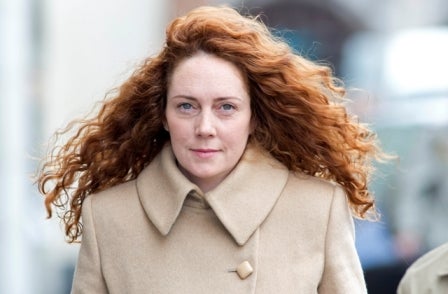
Jurors in the phone-hacking trial were today told to consider who knew about the "rotten state of affairs" that went to the top of the News of the World.
Former editors Rebekah Brooks (pictured above: Reuters) and Andy Coulson and ex-managing editor Stuart Kuttner are on trial at the Old Bailey accused of conspiring to hack phones with others between October 2000 and August 2006.
Summing up the case after seven months of evidence, prosecutor Andrew Edis QC told jurors: "There was a rotten state of affairs at the top of the organisation. What you have to decide is one or two steps about that."
He continued: "This is not an attack on the freedom of the papers. It is not an attack on tabloid papers. It is nothing of the kind. We accept a free press is an essential part of the protection of a democratic society. It is necessary to have a free press.
"The ultimate protection of a democratic society is the rule of law. But the rule of law applies to newspapers in the same way it does to you, me and anybody else. So who polices the journalists? Not Mrs Brooks.
"These are allegations of specific criminal actions against particular individuals."
He told jurors they should consider the motives and character of the defendants.
He said: "Is this the case where young, inexperienced, talented, ambitious, clever, charming people have been placed in a position of great power," and was it the "excitement of the chase" that led these people to decide the law did not matter to them, he asked.
He went on: "We have suggested that the evidence of Mrs Brooks was a carefully choreographed and scripted performance. Certainly she would be well capable of doing that if she put her mind to it." He said that meant it was harder for jurors to "see behind the mask" and added: "If people wanted to spin a line they certainly had the ability to do it."
Edis turned to the evidence about the alleged phone-hacking conspiracy.
He questioned who knew about private detective Glenn Mulcaire who was on a £100,000 annual retainer at the newspaper for years before he was caught phone-hacking in 2006.
He said: "Was Mulcaire value for money? Whose jobs was it to decide that? How come they decided that without knowing what he did?"
He said Mulcaire's arrest along with royal editor Clive Goodman in 2006 was like "somebody turned the light on" in the case.
Other occasions that shed light on the goings on at the News of the World were when it came to light Milly Dowler's phone was hacked and the hacking of David Blunkett's voicemail to Kimberly Quinn, he said.
The first investigation into Mulcaire's hacking showed he had accessed the voicemails of 132 people hundreds of times over 191 days in 2005 and 2006.
And evidence of News of the World phone lines, showed 135 victims had been hacked, averaging a total of nine hacks a day.
Edis said: "There was an awful lot of phone-hacking going on at the News of the World in 2005 and 2006. An awful lot.
"Was it the position as (ex News of the World reporter) Dan Evans says, the office cat knew? Was it the position as Mr Goodman said, hacking was going on an industrial scale?"
All nine hacking trial defendants deny the charges against them.
Email pged@pressgazette.co.uk to point out mistakes, provide story tips or send in a letter for publication on our "Letters Page" blog
